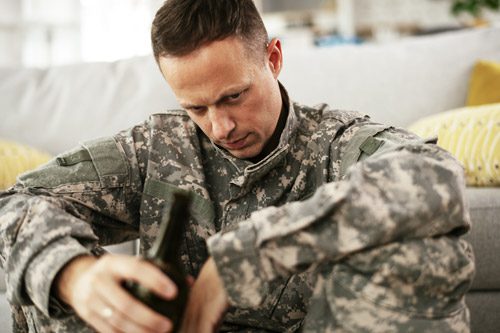
Addiction to drugs or alcohol can affect anyone, but among military veterans, the rate of addiction to certain substances is higher than that of the general population. Often, veterans have a difficult time readjusting to civilian life. Many suffer from disabilities, mental and physical health problems, traumatic brain injuries, and PTSD as a result of their experiences while being on active duty. Once they return home, some veterans self-medicate with drugs or alcohol. Studies show that veterans with exposure to combat, who have sustained combat-related injuries or have been deployed multiple times, have the highest risk of developing a substance use disorder.
Veterans and Alcohol Addiction
According to an article in the US National Library of Medicine, the most frequently abused substance by active military and veterans is alcohol. The study found that the more a person has been in combat, the greater the chance they will engage in binge drinking or heavy drinking. Studies reported by the National Library of Medicine show that more than forty percent of military veterans have suffered from an alcohol use disorder at some point in their lifetime.
Drug Addiction in the Veteran Community
Veterans are often given prescriptions for highly addictive medications to treat conditions such as chronic pain, injuries, PTSD, and many other conditions. In many cases, this is how drug addiction begins. Once the person finds relief from the medications, their continued use can spiral into dependence and addiction. Some medications are potentially addictive even when taken as prescribed. The Department of Defense conducted a study that found that the misuse of prescription drugs by military personnel is two and a half times higher than that of civilians.
The following are the most common addictive medications prescribed to veterans:
- Painkillers – OxyContin, Vicodin, Lortab
- Sedatives – Lunesta, Ambien
- Benzodiazepines – Valium, Ativan, Xanax
A Reluctance to Get Help
Many veterans try to hide their problems with drugs or alcohol, and some even see addiction as a sign of weakness. Others believe they are a failure. Often they continue their denial of the problem until something drastic happens. They may lose their loved ones, become homeless, or engage in domestic violence. They feel lost and alone.
Tony, an army veteran, felt alone and used alcohol to self-medicate. Alcohol was his crutch, his escape. After struggling for years, Tony got the help he needed and was able to become sober. “So, what I would say to other veterans is know that there are people here to support you, in that, people do care about you,” said Tony. “If you need help, there’s modalities here to support you getting your help.”
Don’t “Bite the Bullet” or “Suck it Up” When it Comes to Addiction
Veterans have learned to become experts at “sucking it up” and “biting the bullet” as a way of staying alert and safe in a war zone. Once they return home, it often takes some time for them to understand and accept that they need help.
La Wanda, a Navy veteran, used alcohol and crack cocaine and watched her life deteriorate during that time. Clean and sober for seven years, La Wanda now works with a community service group that is an alternative to incarceration for those addicted to drugs. She practices a program of recovery that includes a 12-Step group. She believes the 12-Step program helps her have long-lasting sobriety and “be a better person.” La Wanda tells people “Hey, I did it, you can do it too.”
Michael, an Army veteran, found it hard to readjust to civilian life. Suffering from PTSD, he hid his feelings and turned to alcohol. He thought no one would understand what he was going through. Michael finally found the courage to get help. “I got to be a man about it and get some courage and quit being a coward and do something about it,” he said. Today Michael is in recovery and says, “Your attitude on life just changes completely when you realize you don’t have to have alcohol to live or to enjoy yourself.”
Do You Need Help?
If you are a veteran struggling with an addiction to drugs or alcohol, you are not alone. You can get the help you need and live a life free from addiction through our veterans program. Call and speak to a professional at English Mountain Recovery, located in the beautiful Smoky Mountains of Tennessee. We will answer your questions and help you get started on your journey to living a clean and sober life.
 Looking into addiction treatment for veterans in Tennessee? To learn more about programs offered at English Mountain Recovery, call and speak with someone today at (877) 615-8569. We are ready to help you or your loved one recover.
Looking into addiction treatment for veterans in Tennessee? To learn more about programs offered at English Mountain Recovery, call and speak with someone today at (877) 615-8569. We are ready to help you or your loved one recover.About the Author: 
Terry Hurley is a retired educational professional and freelance writer with more than fifty years of experience. A former reading specialist and learning center director, Terry loved her years working with children in the educational field. She has written extensively for print and online publications specializing in education and health issues. For the last six years, her writing focus has been on addiction and mental health issues.




